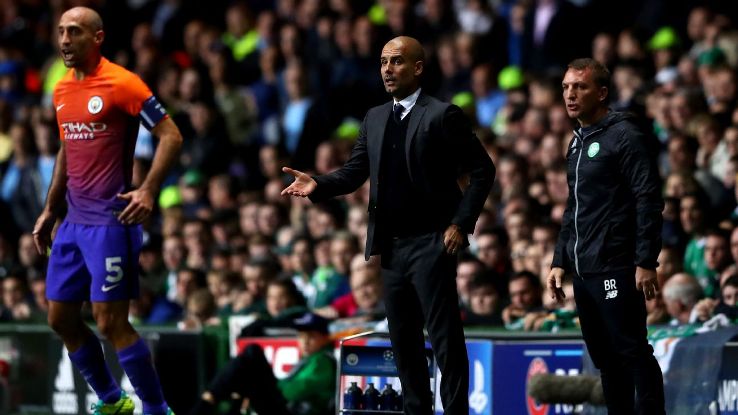For Manchester City, the aim of hiring Pep Guardiola was to establish a European superpower, an institution on the level of his two previous clubs, Barcelona and Bayern Munich. To achieve that, City must win the Champions League — and probably more than once.
Guardiola is in Manchester for three years, a non-negotiable length of tenure he considers the optimum for a manager with any one club. He has spoken of his regret about staying for four at Barcelona. In Glasgow for his second UCL outing with City, Guardiola saw his team fight out a classic 3-3 draw with Celtic, a match in which his team were three times behind yet were unable to find a winning goal, despite scoring their third equaliser in the 55th minute and piling pressure on the tiring Scottish champions.
The Spanish manager won each of his first 10 matches in charge at City without trailing for a minute before the draw with Celtic. Brendan Rodgers’ team took them into frontiers previously unvisited. However, Guardiola appeared unconcerned by that.
“I’m pretty sure the players know we are not going to win every game,” he said before suggesting his current club have a significant distance to travel and plenty to learn if they are to achieve their ultimate prize within that three-year timeline.
“Manchester City don’t have the history in Europe,” Guardiola said. “We have to create it, build up, and maybe this is a good lesson for our future.”
Despite being in the competition every season since 2011-12, Guardioladepicted his new employers as continental novices, still uncomfortable on grand stages such as Celtic Park.
“This club went 25 or 26 years without playing in Europe, 1977 to 2011,” he said. “Europe is so special, the teams are so strong, and Celtic is an amazing environment.”
In the view of City’s manager, Celtic, though the current pauper status of Scottish football renders them minnows, have a legacy as winners of the European Cup in 1967 that City must aspire to.
“Celtic has a huge history in Europe, and we’re here to build up,” he said, making mention of City’s record in the Champions League under their previous managers.
Roberto Mancini could not get City out of the group stage in two attempts, and though Manuel Pellegrini took his team to the semis last season, their lifeless manner in a 1-0 aggregate defeat to Real Madrid meant progress was forgotten in the face of a deflating loss.
“They started with Roberto [Mancini], and with Manuel [Pellegrini], they start to build again and reach the semifinals for the first time,” he said.
It was no dismissal of either man. Guardiola was polite about his predecessors. Having failed to repeat the success of twice winning the Champions League at Barcelona while managing Bayern, who exited at the semifinal stage three years in a row, he is fully aware of the supreme difficulty the competition presents.

Even Celtic, a fourth seed three years absent from the competition with a transfer budget a fraction of City’s supreme spending power, represented a tripwire to trigger.
“We knew when the fourth team in the pot is Glasgow Celtic, you should immediately realise how difficult it is to go through,” Guardiola said.
He was not unhappy with his team, despite some of his touchline behaviour betraying frustration.
“The team gave an amazing effort to recover the situation. It wasn’t easy here in this stadium, where in the last 24 games at home they’ve lost just three: Milan, Juventus, Barcelona,” he said. “In Europe, you can’t concede because [opponents] are a machine, and they are there to punish you.”
Celtic were handed credit for the pressing game that took the match to City in a manner no English team had yet managed.
“They are strong in the long balls, and they have amazing wingers,” Guardiola said, tipping warm praise toward James Forrest and Scott Sinclair on the flanks.
City also had to retain their composure amidst an intimidating atmosphere that Celtic manager Rodgers said made for “a noise I’ve never heard before.” Decibel levels from the home fans were deafening from the kickoff and continued through an opening half-hour in which it seemed their team might score with each attack. Later, the raucous crowd inspired weary legs to hang on at the end, just when City seemed destined to snatch victory.
Celtic, though, are a vastly different proposition from what faces Guardiola’s team in their next Champions League assignment, an Oct. 19 visit to Barcelona as part of a home-and-away double-header. On Wednesday, Gerard Pique’s winner in a 2-1 victory at Borussia Monchengladbach put Guardiola’s former team top of Group C on six points, with City second on four. Barcelona won each of the four occasions the two clubs met under Pellegrini’s management during the 2013-14 and 2014-15 seasons.
Guardiola’s next two Champions League matches should help him judge how far along he is in reaching his ultimate goal and how much farther he has to go.
John Brewin is a staff writer for ESPN FC. Follow him on Twitter














